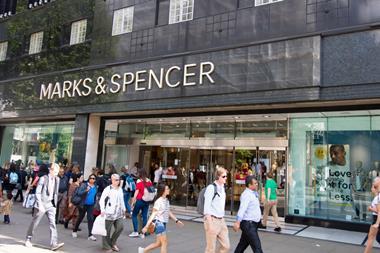Theo Paphitis has called on the government to “grasp the business rates nettle” as he gave an update on Christmas trading and Ryman posted its first annual loss in more than two decades of his ownership.

The tycoon’s Theo Paphitis Retail Group, comprising lingerie specialist Boux Avenue, hardware business Robert Dyas and stationer Ryman, achieved 15.6% sales growth versus 2019 in the six weeks to December 24.
The golden quarter performance was driven by online, which was up 87.5%, while stores were down 6.3%.
In the year ending in March 2021, all of the businesses suffered EBITDA losses, but Paphitis was pleased by their resilience and progress made.
Paphitis told Retail Week: “Retail remains a fantastic and exciting, innovative industry to be in, and one which we are incredibly proud of.
“It is resilient, defiant in the face of the unexpected and continues to create careers at all levels and deserves to continue to be a sector that is fairly supported.
“While business was supported through the pandemic, especially as stores were closed in unprecedented circumstances, the continued reluctance of the government to implement a fair and just realignment of the business rates tax, fit for the 21st century, continues to damage the industry.
“We need a grown-up government to grasp the business rates nettle and deal with it. While appreciating the complexities of the task, it’s by no stretch of the imagination impossible to complete in this modern age.
“We need a grown-up government to grasp the business rates nettle and deal with it. While appreciating the complexities of the task, it’s by no stretch of the imagination impossible to complete in this modern age”
Theo Paphitis
“The focus for 2022 is building on the positive, innovation and our colleague development, in order to satisfy our customers. We, like so many in this sector, have responded well when we’ve had everything including the kitchen sink thrown at us and will continue to dig deep to keep physical retail alive, as a key function of communities, but we cannot do this on our own. Over to you Mr Prime Minister.”
Boux Avenue notched up sales growth of 9.1% last year. Paphitis said there had been “significant progress” following a strategic review in 2019.
Boux reduced its underlying EBITDA loss to £3.5m from £14.9m. Paphitis said performance has “further improved into the current financial year, with sales and profits well ahead of last year”.
Ryman’s city centre store estate and reliance on business and student customers meant it sustained an EBITDA loss of £8.5m versus profit of £7.8m the previous year, “bringing to an end a run of over 25 years of profitable performance”. Robert Dyas’ EBITDA loss improved by £2.4m to £0.7m.
Paphitis said: “We are pleased with the performance and progress in the financial year ended March 2021 and inevitably the pandemic has affected our brands in different ways, with Boux Avenue and Robert Dyas making excellent progress in this last year.
“The results demonstrate the hard work and dedication of our colleagues across the group, and how the stores and online arms have worked together, building on our strategy and crucial investment prior to and during the pandemic.
“The group’s overall growth during our peak trading period shows further progress and resilience through and out of lockdowns.
“The strength of our ecommerce trading masks the much more challenging store environment, in particular in city centres and prime locations, where business rates are unfairly high. It is therefore a major disappointment that this has failed to be structurally addressed by the chancellor.”
- Sign up for our daily morning briefing to get the latest retail news and analysis





























No comments yet